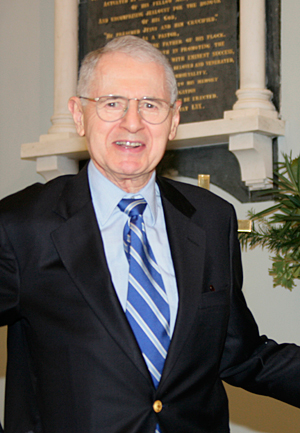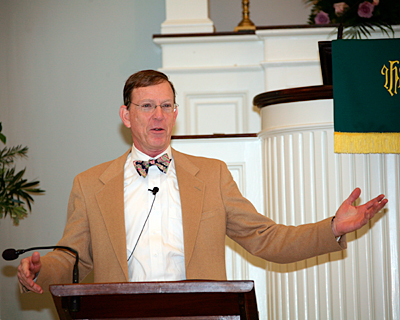“As a boy of 12, I was absolutely captivated by the writings of the apostle Paul. I read them and re-read them.
 Arthur Caliandro, speaker for the Hamrick Lectureship, spoke about “Giving Life Your Best.”
Arthur Caliandro, speaker for the Hamrick Lectureship, spoke about “Giving Life Your Best.”Paul never had an easy day, and yet his attitude remained positive,” Arthur Caliandro, senior minister at the Marble Collegiate Church in New York City and son of a Methodist minister, stated at the 13th annual John A. Hamrick Lectureship held at First Baptist Church, Charleston, Jan. 20 and 21.
In his lecture, “The Power of Attitude,” Caliandro said, “A bad attitude and Christianity are incompatible. Jesus came to bring hope to the world.” He quoted, “?’All things work together for good for those who love the Lord.’ It doesn’t say some things or occasionally things work together. It says all things. Attitude is a choice. It is the one thing that you and I have total control over. No one else can give us an attitude. Our attitude is totally under our control.”
On Monday morning in his talk, “Live Your Best Life,” Caliandro stressed, “This is the day the Lord has made. Let us rejoice and be glad in it.” He reminded the audience, “There is nothing we can do about yesterday. It is gone. We have no assurance of tomorrow. This day is the time we have. The average funeral lasts less than an hour. Our entire life is summed up in less than 60 minutes and the world moves on. Think about your own obituary and what it will say about you. You can change it, starting today.”
He recited example after example of how a change in people’s attitude changed their lives and had a positive affect on the lives of people around them. “Remember every one around us is struggling. Life is not easy. Hardships and disappointments come to everyone. We can help to make their loads lighter. Every day is a fresh opportunity to begin again. We serve a compassionate God,” he concluded. “Every soul is precious to him. He will not leave us alone.”
Caliandro has served Marble Collegiate Church as senior pastor since 1984. He was an associate pastor there the previous 18 years, and before that served rural churches in Ohio and New York. Most people know him from the Sunday morning program televised over the Hallmark network.
 Walter Edgar presented a paper on “Charleston in the 1690s” at the Hamrick Lectureship.
Walter Edgar presented a paper on “Charleston in the 1690s” at the Hamrick Lectureship.Walter Edgar, Distinguished Professor of History at the University of South Carolina, delivered an original paper commissioned by the lectureship committee on the conditions in Charleston and South Carolina when First Baptist Church moved from Kittery, Maine, to Charleston in 1696. “South Carolina was the most religiously diverse colony in the New World. Many historians state that it was New York. Not so. South Carolina wins hands down. Dissenters, Baptists, Presbyterians, Huguenots and Quakers were encouraged to settle South Carolina, and they were permitted to vote and hold public office.” He outlined the conditions that greeted William Screven and his little band of Baptist settlers. “The area was not a healthy place to be. There was a major illness or plague about every other year. The death rate was high. Any population increase came from immigration.”
Special music was provided by Chase Saulisbury and Martha Thigpen, soloists, and Stephen Distad, minister of music. The Joy Club invited conference participants to a soup and cornbread lunch.
Carol Ezell-Gilson led a tour of other buildings in Charleston that were designed by Robert Mills, the first native-born American architect. Mills also designed First Baptist Church, which was dedicated during the pastorate of Richard Furman in 1822.